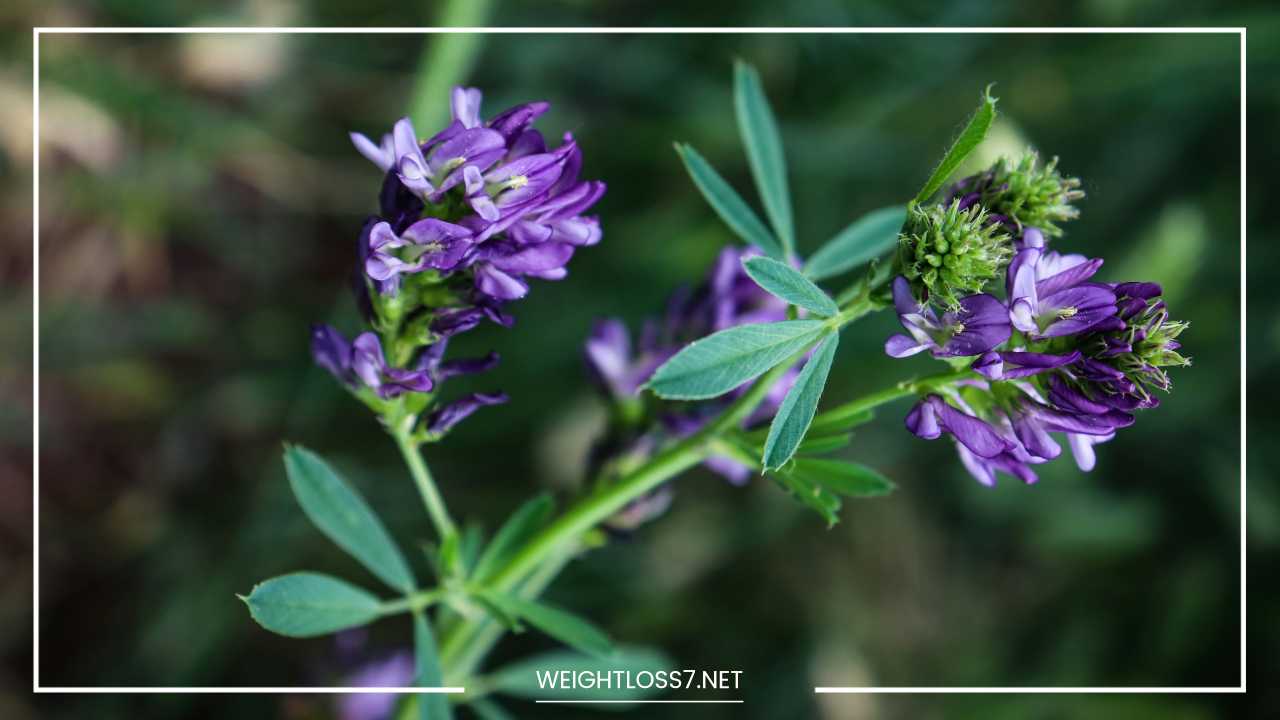Alfalfa Herb Use and Health Benefits

Alfalfa
Exploring Alfalfa: A Comprehensive Journey into its Dietary, Medicinal, and Agricultural Marvels
Alfalfa, scientifically known as Medicago sativa, stands as a botanical treasure with a rich tapestry of historical significance, dietary versatility, and medicinal potential.
This perennial herb has captivated cultures for centuries, proving its worth not only in the culinary world but also as a potent herbal remedy and a valuable component in agriculture.
As we delve into the multifaceted aspects of Alfalfa, we uncover its diverse uses, nutritional benefits, and its significant role in both human health and horticulture.
Health Wonders of Alfalfa: Balancing Cholesterol and Glucose
In the realm of health and wellness, Alfalfa has emerged as a promising agent with the potential to positively influence cholesterol and glucose levels.
Studies on Alfalfa as a dietary supplement have revealed a spectrum of benefits. It is essential to acknowledge the cautionary note that, while generally safe for consumption, a small percentage of individuals may experience lupus-like symptoms due to the presence of L-canavanine—an amino acid found in the seeds and sprouts of Alfalfa.
Interestingly, the leaves of the Alfalfa plant, often used in supplements, do not contain this compound, making them a safer alternative for many health enthusiasts.
Historical Roots: Alfalfa in Chinese and Arab Traditions
Tracing its roots back to ancient times, Alfalfa has a rich history embedded in diverse cultural traditions. The Chinese, recognizing its diuretic properties, began using Alfalfa as early as the sixth century to alleviate fluid retention and swelling.
Meanwhile, the Arabs bestowed upon Alfalfa the illustrious title of “the father of all foods,” highlighting its nutritional richness.
This multifaceted herb has played a pivotal role in both traditional and herbal medicine, earning a place not only in human diets but also as essential animal fodder for over a millennium.
Nutrient Powerhouse: Unveiling Alfalfa’s Rich Composition
The nutrient profile of Alfalfa is a testament to its botanical prowess. The leaves are a veritable treasure trove of essential minerals, including potassium, calcium, and magnesium, complemented by the presence of carotene.
The Arab tradition of feeding Alfalfa to horses, believing it bestowed swiftness and might, underscores its historical significance.
Over time, Alfalfa has evolved from a mere animal crop to become a stalwart in herbal medicine, addressing a spectrum of human health concerns.
Versatile Remedy: Alfalfa in Herbal Medicine
The diuretic and laxative properties of Alfalfa position it as a versatile remedy for various health conditions. Its efficacy extends to urinary tract infections, kidney disorders, bladder issues, and prostate disorders.
Recent scientific findings have brought to light its potential to regulate cholesterol levels. Acting as a natural agent that binds to cholesterol,
Alfalfa prevents its accumulation in the bloodstream. Furthermore, ongoing research hints at Alfalfa’s role in regulating blood sugar levels, offering potential benefits for individuals managing diabetes.
Culinary Elegance: Alfalfa’s Integration into Gastronomic Traditions
Beyond its medicinal properties, Alfalfa has seamlessly integrated into culinary traditions. Widely enjoyed in salads or as a standalone vegetable, Alfalfa adds a unique texture and nutritional boost to meals.
Its nutritional density, often compared to wheat grass and algae, positions Alfalfa as a powerhouse of fiber, vitamins, minerals, and digestive enzymes.
Taste Transformations: Navigating Alfalfa’s Unique Flavor Experience
However, the culinary journey with Alfalfa is not without its challenges. Advocates of Alfalfa often caution about its acquired taste, describing initial experiences ranging from a mild burning sensation on the tongue to outright dislike.
Yet, those who persist in incorporating Alfalfa into their diets are rewarded with a diminished appetite for heavier foods, highlighting the transformative potential of regular consumption.
Beyond Health: Alfalfa’s Influence in Various Applications
Moving beyond its role in human nutrition and health, Alfalfa’s influence extends to diverse applications. Recognized for its fever-reducing properties, Alfalfa has been a staple in traditional medicine.
Its natural fluoride content contributes to dental health, offering protection against tooth decay. Alfalfa’s versatility is further highlighted in the realm of gardening, where it serves as a valuable component in creating nutrient-rich tea.
Gardener’s Delight: Alfalfa in Horticulture
Gardeners with a penchant for cultivating Irises and Delphiniums find particular delight in using Alfalfa tea as a foliar spray.
Its benefits extend to flower beds, where it is embraced as an effective and sustainable mulch. The rich composition of Alfalfa makes it a favored choice for those with a green thumb, showcasing its potential to enhance soil fertility and plant vitality.
In Conclusion: Alfalfa’s Enduring Relevance
In conclusion, Alfalfa emerges as a botanical powerhouse with a storied history and an array of practical applications.
Its journey from ancient Chinese diuretic remedy to a modern dietary supplement underscores its enduring relevance.
As scientific exploration delves deeper into the intricacies of Alfalfa’s biochemical makeup, its potential to address contemporary health challenges becomes even more apparent.
Whether enjoyed on the plate, brewed into tea, or employed in herbal remedies, Alfalfa stands as a testament to nature’s capacity to provide multifaceted solutions for our well-being.
Embracing Alfalfa means embracing a botanical ally that has woven itself into the fabric of human and agricultural evolution, offering a myriad of benefits for generations to come.

















